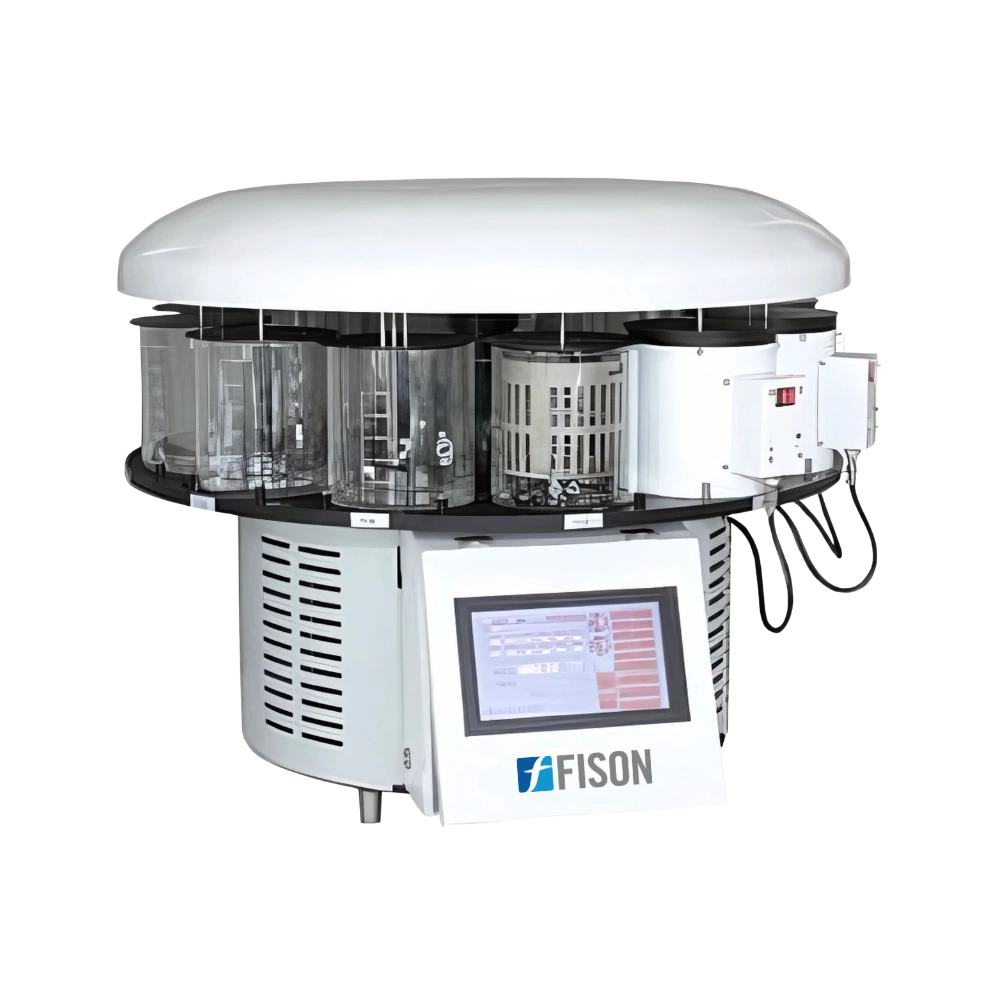

Spin Tissue Processor FM-STP-A101 is a carousel-type, 12-station automated tissue processor. It is designed with a 1.2 L capacity, 9 containers for high-precision tissue dehydration. Our tissue processor is equipped with an anti-collision stopping device for hanging baskets. It features PLC control, vacuum agitation, and UPS backup, making it ideal for clinical and research applications.
$7,218.00
| System Type | Carousel, 12 stations |
| Glass Reagent Container | 9 containers 1.2L capacity |
| Wax Container | 3 container 1L capacity |
| Wax Temperature Range | 60°C to 99°C |
| Processing time per cup | 0 to 59 hr 59 minutes per station |
| Working Temperature | 5°C to 40°C |
| Ambient Humidity | <85% (at 20±5°C) |
| Tissue Basket Motion | 3 times/min Vertical reciprocation |
| Tissue Basket Size | 95×100mm |
| Layered Nacelle(Cups) | 95×80mm 5 layers |
| Time Range | 1 to 999min |
| Power Consumption | 400 to 500 W |
| Power Supply | AC220V/110V, 50 Hz |
| Dimensions(L×W×H) | 670×550×680 mm |
| Package Dimensions(machine)(L×W×H) | 750× 760× 700 mm |
| Package Dimensions(tanks)(L×W×H) | 600×400×550 mm |
| Net Weight | 53kg |
| Gross Weight | 100kg |
| Reagent Bottle | 9 pcs |
| Paraffin wax tank | 3 pcs |
| Wax tank connection line | 3 pcs |
| Tissue basket | 1 pc |
| Tissue cassette | 20 pcs |
| Hexagonal Wrench | 1 pc |
| screwdriver | 1 pc |
| Fuse(5A) | 2 pcs |
| Power line | 1 line |
1: In the Spin Tissue processor FM-STP-A101, what is the role of vacuum agitation?
In Spin Tissue Processor FM-STP-A101, vacuum agitation enhances the penetration of reagents into tissues by removing trapped air and minimizing resistance. This ensures more uniform dehydration and infiltration, especially beneficial for fatty or dense tissues.
2: Why programmable time range is important in the Spin Tissue Processor FM-STP-A101?
Different tissues require varying processing durations. Spin Tissue Processor FM-STP-A101 allows station-specific timing (1–999 minutes), enabling tailored protocols that prevent over-processing or under-infiltration, ensuring high-quality tissue morphology.
3: In Spin Tissue Processor FM-STP-A101, how does constant temperature control improve paraffin embedding?
In Spin Tissue Processor FM-STP-A101, Precise wax temperature (60–99°C) ensures complete paraffin penetration without overheating, which could damage tissue structure. Stable temperature also reduces wax crystallization and contamination risks.
4: Can I customize the starting cylinder in Spin Tissue Processor FM-STP-A101?
Yes, Spin Tissue Processor FM-STP-A101 allows users to define which cylinder the process begins from; this flexibility helps align workflows with reagent conditions or schedule constraints in high-throughput labs.
5: Why is an anti-collision sensor important in the Spin Tissue Processor FM-STP-A101?
In Spin Tissue Processor FM-STP-A101, the anti-collision function protects the tissue basket from mechanical damage during motion. It automatically halts operation if resistance is detected, ensuring equipment longevity and sample safety.
6: Is it possible to edit a processing program mid-cycle of the Spin Tissue Processor FM-STP-A101?
Yes, Spin Tissue Processor FM-STP-A101 supports real-time editing. Users can adjust timings or steps during operation without disrupting the ongoing process, offering flexibility for unanticipated sample needs.


Fison’s Spin Tissue Processors are high-precision, automated carousel-type systems designed to streamline the tissue preparation workflow in biomedical research laboratories. Engineered with high-quality processing stations and maximum reagent capacity, it delivers reliable tissue dehydration, clearing, and paraffin infiltration with minimal operator intervention. Our Spin Tissue Processors feature programmable logic control (PLC), vacuum agitation for enhanced reagent penetration, and an anti-collision basket system to ensure sample safety. Whether deployed in clinical pathology, academic institutions, or pharmaceutical R&D, the Spin Tissue Processors ensure efficient, reproducible tissue processing, supporting the creation of high-quality paraffin-embedded specimens for microscopic examination.